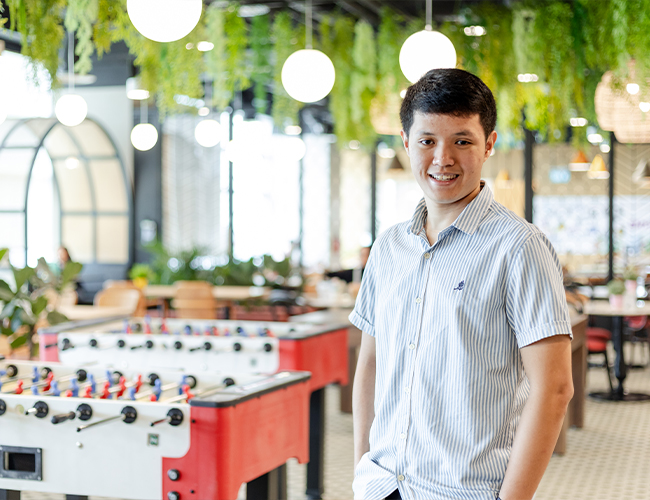
“The recent popularisation and widespread adoption of AI-powered tools such as ChatGPT and GitHub Copilot reflect AI’s growing appeal as a medium for efficiency and practicality. Beyond just efficiency, owing to its huge cost-cutting potential, many industries are attempting to integrate AI into their workflows and products. This also means that we can expect to see a rise in the number of jobs relating to AI in the near future.
During my stint at the Personal Data Protection Commission, Generative AI was the buzzword; there were a lot of concerns over how the use of AI would affect data privacy and which parties should assume responsibility in the event of mishaps like a data leak. With such complex questions arising, it is important to incorporate ethical and social perspectives into the development of AI systems, in addition to ensuring compliance with existing laws. As such, the role of an AI ethicist becomes ever so important, and I anticipate its prevalence.”
- Stalin Muthukumar Bill Kirankumar, Smart Nation Scholar

“In the financial world, AI has already demonstrated its ability to be a successful yet unbiased tool in the field of algorithmic trading and data analytics, replacing many previous roles such as brokers and traditional analysts. Perhaps some promising new roles could include AI Ethics Officers (someone who ensures that systems would comply with ethical standards and regulations) or even financial therapists (someone who guides clients on managing stress and irrational behaviour related to their investment decisions).”
- Matthew Zach Neo Jia Jun, SLA Undergraduate (Overseas) Scholar

“I think the ability of humans to programme the AI technology will always remain relevant and essential. As AI is developed over time through machine learning to replicate the work that humans carry out, such technology will continuously evolve with human creativity when loopholes in AI technology surface. I think creativity in problem-solving will be a critical skill that will enable human intervention to be integral to further advancements in AI technology.”
– Natasha Cheng, Wan Hai — MartimeONE Scholar

“Human creativity crucially distinguishes us from machines. Creativity can come in many forms – emotional and social intelligence, critical thinking and problem solving etc. But the main distinguishing factor for me will be morals and ethics. Morality is such a qualitative and subjective concept that will be immensely difficult to model. Even amongst people of strong moral character, debates on this topic are endless. To this end, I am certain that morals and ethics will remain and important value to have in an increasingly AI-dominated world.”
– Keynes Tay, EMA Overseas Undergraduate Scholar (Full-Term)

“I find the emerging AI-related professions within the realms of AI-assisted healthcare specialists particularly exciting and promising. Healthcare is increasingly benefitting from AI applications in diagnosing diseases and personalising treatment plans. AI can help healthcare organisations improve the efficiency of both backoffice tasks to patient care. AI and automation can reduce the time healthcare workers spend on paperwork and other administrative tasks, giving them a greater bandwidth for more face-to-face time with patients. For instance, generative AI can help clinicians take notes, summarise content, and keep medical records as thoroughly as possible. AI can even help healthcare organisations gather and share information more easily, thereby connecting disparate healthcare data. This can help medical professionals keep track of patient data more efficiently. Medical professionals who are trained in interpreting AI-driven insights and who can collaborate with AI systems in healthcare systems are likely to be in high demand.”
– Jessica Koh Rui Ying, STB Full-Term Overseas Scholar

“Whilst it has been interesting to witness the development in AI technology allowing for the generation of creative work, it still remains that the best works in creativity require the human touch, and this would most likely remain true for a long while yet. An instance of this would be that it could be possible for AI systems to write compliance policies for a company’s information security policy, but such policies may seem very verbatim and may not properly match the conditions and realities on the ground. This example drives home the notion that humans will always have a place in the job field and instead of fighting the currents of AI, we should actively embrace the technology as a means of making our work more productive and adding value to the job tasks that we have or are working on.”
– Oi Jun Jie, Smart Nation Scholar


